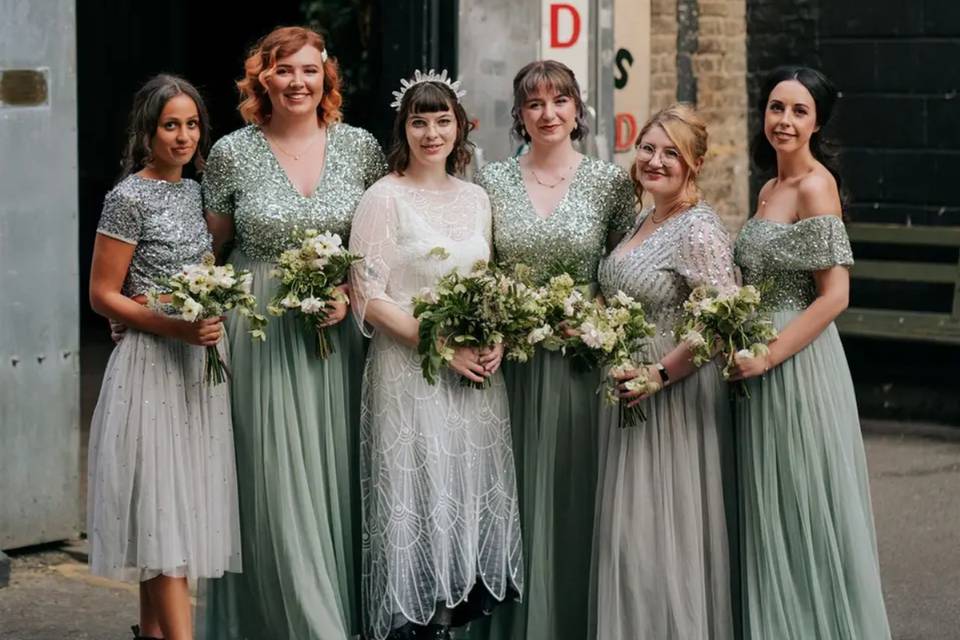Love Languages: What Are the 5 Types & What Do They Mean?
Your love language identifies the way you like to show and receive love, and knowing you love language is so important for a healthy relationship. Here's how to find out yours and what the love languages mean

Have you and your partner ever had a conversation about love languages?
Chances are you've heard of them. The concept was created by relationship expert Dr Gary Chapman in his book The 5 Love Languages: The Secret to Love That Lasts and have become one of the most helpful tools for growing a healthy, happy relationship.
Often used by relationship counsellors, these languages refer to the way that you like to receive affection from your partner. By understanding how you like to be shown love and how you show love to others, couples can connect more deeply and resolve conflicts quicker. In fact, studies have proven that understanding your partner's love language can increase relationship satisfaction and longevity.
Essentially, identifying your love language is one of the simplest things you can do that will have a huge impact on the happiness of your relationship. We're going to explain what the five love languages are, how to find out your love language, and how it can help your relationship. Read on!
READ MORE
- 60 Date Night Ideas for Every Budget
- 25 Relationship Tips from Real Couples and Experts
- 55 Romantic Quotes to Express Your Love
What are the Five Love Languages?
Do you love to make a coffee for your partner in the morning, but it doesn't occur to them to make one back? Do they love to cuddle, kiss and hold hands but they rarely give you a compliment? You could be working with different love languages.
The basic premise of love languages is that people experience love in different ways and most people have a preference for how they receive and communicate love. If that preference is different to yours, your partner could inadvertently hurt your feelings when they try to express their love to you and your love could get lost in translation back.
There are five love languages: words of affirmation, quality time, acts of service, receiving gifts, physical touch. Everyone can relate to all of them, but you'll have a primary one that speaks to you the most.
1. Words of Affirmation

Those with words of affirmation as their love language value spoken acknowledgements of their partner's love. You want to hear what they admire and appreciate about you, with lots of 'I love you's, compliments, verbal encouragement, thanks for things you've done for them, and frequent communication, whether that's by text, video messaging or calls.
These people need to hear how much they matter to you to feel understood and appreciated. If you don't actively tell or write down these words, they may struggle to understand the depth of your love for them, even if you think you're expressing it clearly in other ways.
Why Words of Affirmation Can Cause Conflict
The problem when one person has words of affirmation as their love language is that the other partner can interpret them as being 'needy' or 'insecure'. Truthfully, it costs nothing to tell someone you love that you love them, so get into a habit of saying at least one compliment to your partner a day and telling them you love them (perhaps when you wake, go to bed, or leave the house). It will make your partner feel so valued.
Being sensitive to positive words of affirmations also makes us extra susceptible to hurtful words. This can cause tension and conflict in a relationship, however, if you learn to respect your partner's love language, much of this can be avoided. Be mindful of the words you use during an argument as they will leave a deeper impression than you might think.

How to Express It Right
If your partner prizes words of affirmation as their primary love language, here are some ideas of what you can do to make them feel loved:
- Leave a sweet post-it note to find when they wake up in the morning
- If you're apart for some time, send them a video message or letter with the reasons you're missing them
- Send texts messages telling them that you're proud of them or saying you love them
- Tell them they look good in their outfit today. Speaking these words in front of others can double their value
- Share something they did on social media to show your pride
2. Quality Time

We all enjoy spending time with the person we love. For those with quality time as their primary love language, actively setting aside time for them and offering your undivided attention is the ultimate way to say 'I love you'. They want to be the most important thing on your agenda, so put down your phone, turn off the TV and concentrate on them one-on-one. It doesn't have to be on a dedicated date night; it can be going on a walk together, playing a board game or doing a hobby together - pretty much anything where you're spending quality time.
Your body language will be really important to them too: they want you to see you actively listening to them and being fully present in the moment. If you set aside an evening to snuggle and watch a new boxset with your partner, they'll feel let down if you answer work emails or scroll social media while they want to just be with you in the moment.
Why Quality Time Can Cause Conflict
Many couples complain that they stop dating each other once they get married - they live in the same house and sleep next to each other every night, but they don't make time for each other. Here is where there can be a mismatch in the priority of quality time.
One partner can genuinely feel like you spend a lot of time together, while the other might feel ignored because during those moments your attention is on making dinner or finding a show to watch. The way to solve this is through communication: you can't expect your partner to read your mind so tell them what you want. Once they understand that quality time is your love language, they should hopefully intuitively do things like suggest a weekend away.

How to Express It Right
Quality time spent with your partner does not have to be expensive or even involve leaving the house; here's some ways to spend quality time together:
- Set aside an afternoon for a walk or a bike ride with lunch in a local pub where you don't look at your phones
- Accompany your partner on their errands, even if its just to go to the supermarket, and take the time on the drive to have a meaningful conversation
- Try out a new restaurant together - especially if its on a weekly date night
- Plan a picnic with some of their favourite snacks
- If you have the spare budget, plan a weekend away for the two of you without any distractions.
3. Acts of Service

Acts of service sounds very biblical, but what it means is that you do little things for your partner to make their life easier. For these people, actions speak louder than words and they like to be shown how much you care for them.
Many of these small acts can take place around the home, like proactively scraping ice off their car on a cold day, bringing them a coffee in bed when they wake up, or cooking and washing up after a busy day. Lots of people who have acts of service as their love language are very self-sufficient, independent people: it's not that they need a partner who'll do everything for them, they want someone to want to make their life a little easier. You love them and therefore want to ease the burden of their responsibilities.
How Acts of Service Can Cause Conflict
We need to get rid of the idea that acts of service means one partner doing all the household chores without any asking or thanks - it's definitely not that. Acts of service are a way of taking care of our partner and are reciprocated with thanks and love. However, if one person begins to feel like an unappreciated doormat, you're going to find simmering resentment.
It can also be frustrating when one person tries to do an act of service for you - like washing and drying your laundry - and does it wrong. For the person doing it, you can understand why it begins to seem more trouble than it's worth and can lead to arguments.
In a relationship with good communication, you should be able to tell with your partner what act of service would mean the most to you and how you'd like it done. Your partner then tells you what they would like best in return, according to their love language. It may seem very transactional and unspontaneous on the surface, but it's actually a very simple way to show you respect your partner's love language and will reduce conflict.

How to Express It Right
Broken commitments will make your partner feel unloved, so don't make promises you can't keep here. Instead, commit to some of these acts:
- Pack your partner lunch for the day and make sure to include their favourite treat
- Fill up their car with petrol
- Bring them breakfast or tea in bed then make the bed
- Put their towel on the radiator so it's warm when they get out the shower
- Buy their toiletries when you notice them getting low
- Complete a project that's been on their list for a while, such as putting up a shelf
4. Receiving Gifts

This love language tends to get a bad reputation when it's mistaken for being materialistic or superficial. That isn't what receiving gifts is about at all. Instead, people with receiving gifts as their primary love language thrive on the thought behind a present. They don't need anything expensive, just something that shows care went into choosing it.
It can honestly be as small as buying them their favourite chocolate after a tough day at work or ordering a book they said they'd like to read. What they actually like is to see that you have listened and remembered things that they talked about while with you, and the gift is a physical reminder of that attention and care.
How Receiving Gifts Can Cause Conflict
Do you have a friend who drops round with a magazine if they know you've been off ill? Do they always make you smile with their thoughtful birthday and Christmas presents which are things you mentioned in passing months before? And do you feel slightly guilty when your return gifts are less personal? It's likely their love language is gifts and yours isn't.
Receiving gifts in a relationship can cause problems when it's one-sided. If your partner showers you with thoughtful gifts - from booking a surprise weekend away to framing a special photo of you both - they will appreciate getting them back. But if this isn't your love language, it can seem very overwhelming to constantly have to think of nice little surprises for your partner.
For both of you, remember what the physical item symbolises and find a balanced way to show that to each other that doesn't make one of you feel guilty, used or misunderstood.

How to Express It Right
Again, receiving gifts isn't about spending lots of money so don't feel overwhelmed that you might not have the bank account to support someone with this love language.
- Make them a playlist on Spotify and tell them why you chose each song
- Buy them their favourite flowers
- Hide a special treat in their bag when they're going away, from a cupcake to a new book
- Book tickets to a museum or gallery exhibition (totally ok if it's a free exhibit!)
- Put together a time capsule or scrapbook of memories
- Give them a personalised coupon book
5. Physical Touch

Physical touch is the easiest to explain of the love languages: your partner feels appreciated by physical acts of affection such as kissing, cuddling, holding hands, and sex. For them, it is the most powerful emotional connector and intimacy affirms your love stronger than words can.
Physical touch does not always lead to sex; it is about making someone feel emotionally secure. It could be a physical shoulder to cry on after bad news, a hug as you make breakfast in the morning, squeezing your partner's hand and surprise kisses while out in public, and curling up on the sofa together to watch a film.
Think of that warm, fuzzy feeling you get when you see old people holding hands. Physical touch communicates comfort, safety and love.
How Physical Touch Can Cause Conflict
Not everyone is raised in a touchy-feely family and, for some people, touch is way out of their comfort zone. It can actually be annoying if their partner is constantly wanting to hold their hand.
They must put themselves in the shoes of their partner. When physical touch is rejected, it can be interpreted as feeling indifferent to them or as not worthy enough for them to hold you. For someone with a poor body image, you can spiral into feeling like your partner is no longer attracted to you.
It can also cause problems if the only time physical touch is instigated is when a partner wants sex. You can begin to feel that they only show affection when they want something back.
Once again, you have to communicate with your partner and tell them how much that physical touch means to you.

How to Express It Right
Sex is a great form of physical touch but it's certainly not the only way to deepen intimacy:
- Offer to give them a massage without them having to ask
- Put your arm round them, hold hands and kiss your partner when out in public
- Sign up for a dance class such as bachata, a sensual dance from the Dominican Republic
- Find a cinema with sofas and snuggle up to a film on a date night
- Give your partner kisses and hugs at random points
Why Are Love Languages So Important?

When we enter into a relationship with someone, we have a responsibility to care for that person and that means fulfilling their needs on an emotional level. As we mentioned above, there are lots of ways that ignoring your partner's love language can lead to unintentionally hurting them.
You absolutely don't have to have the same love language as your partner, but you need to know yours and theirs to have a balanced relationship where both partners feel loved and valued.
Remember: the way you like to give love may be different from the way you like to receive it. You both need to identify your own love languages first and then communicate them to each other.
How Do I Find My Love Language?

Remember Gary Chapman, the man who wrote the literal book on love languages? Fortunately, he has a website with a fantastic love language quiz on it that will discover which of the five is your primary love language and tell you how to use it to connect better with your partner.
You can take the test here. It takes about 5 minutes to complete and asks you to assess a series of statements about what is more meaningful to you. What's handy about this quiz is it breaks down into percentages how important each of the love languages is to you, so you know what's most and least important to you.
Alternatively, you can sit and ask yourself what makes you feel most loved in a relationship. The answer will fit into the framework of the five love languages and give you a starting point for talking with your partner.
Do I Only Have One Love Language?

No, everyone has all of the love languages to different extents, and a healthy relationship with have a good dose of all of them. One language might be preferred, but it doesn't mean you don't like kissing just because you like a thoughtful gift too.
Once you've both worked out your primary love language, you need to communicate this with your partner. Talk and listen as you both explain the things that make you feel most loved and what you would like to see more of from your partner. It's not about calling them out for never making you a cup of tea, but helping them understand what that tea means to you.
If you find yourself continuing to argue, it can be worth going to a relationship counsellor and talking through your issues with them. An outside perspective can be invaluable when trying to communicate what we want.
Looking for some words of wisdom about love? Here's 125 relationship quotes that will make you feel warm and fuzzy inside.








